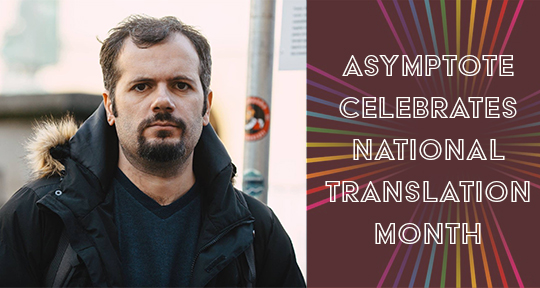Though Asymptote has made it a point to celebrate literary translation no matter the time of year, we’re still pretty thrilled that there’s a whole month dedicated to the cause. As we draw towards the end of National Translation Month, Asymptote is taking the opportunity to bring together essential components that complete the cycle of literature as it travels from one language to the next, with the intention of recognizing the meticulous, purposeful, and intimate labour invested into a text during this peregrination—from conception to publication. We have asked four valued members of the literary community, spanning the globe, to bring us their take on translation and its gifts.
With this first feature, we are honoured to introduce an original text by Radu Vancu, a brilliant Romanian writer and translator (and past Asymptote contributor!) who traverses the international literary arena with a virtuoso expertise and a seemingly time-defiant profusion. In the following essay, he discusses his ongoing project to translate the works of Ezra Pound into Romanian, and thus brings to the forefront the great modernist’s defiance of limits. This poetry, which spans time, language, and cultures, is a testament to the sublime nature of translation, and its endless capacity for encapsulation.
Ezra Pound quickly understood that, in the case of poetry, regeneration is actually reinvention—or, more synthetically and apparently more paradoxically, inventing is actually reinventing. Poetry can live only through the graft of all that is alive throughout all ages, all cultures, all languages. Therefore, Pound came to understand that poetry does not mean only regenerated language, as he originally believed; it is instead a translingual, transnational, and even transcultural body, built (or “excerned,” to use his own word) by the addition of all the “living parts” still active in the geological layers of poetic language.
He says this in more contracted and memorable form in a 1930 Credo: “I believe that a light from Eleusis persisted throughout the middle ages and set beauty in the song of Provence and Italy.” J.J. Wilhelm also observes, in Ezra Pound: The Tragic Years, that this proposition is in full consonance with a small text by Pound, Religio, from 1910—forming thus, in my opinion, an approximate backbone of Pound’s poetics, otherwise so branched and polymorphous.
The poet must coagulate in their work this migrant light which iridesces simultaneously the Eleusine texts, the Provençal ballads, the Italian sonnets, in addition to the ancient Chinese, Greek, and Latin poetry, and so on. It is their task, therefore, to not only regenerate the poetic language—this enormous burden is still too simple—but to build an enormous, resonating device which would reverberate with beauty from all times, all spaces, all cultures. This is why it is hard to capture in translation the beauty of an Ezra Pound poem: because some poems substantiate the ancient Greek beauty, harsh and dangerous (“seek ever to stand in the hard Sophoclean light / And take your wounds from it gladly,” a poem says); some others take the form of Medieval villanelles, ballads, or shapes invented by Pound himself (the villonaud, for example), coalescing in another kind of beauty—seductive, chanting, feminine, sweet; some others reinvent a traditional Chinese aesthetic in the English language of the twentieth century; and so on. What is remarkable and astounding is that you, a twenty-first-century reader of English, can resonate with all these varying types of beauty. Pound’s genius is precisely that he succeeded in making new and alive the beauty of all great poetic languages, including the old or “dead” ones.
His achievement is that he can adapt his resonating apparatus to all the diachronic wavelengths of beauty. The construction of the poem—his physis—also varies according to the oscillation of this wavelength; when “making new” the ancient Greek epigrams, the poem has two or three lines, quite rarely more, and the Idealtypus of the beauty targeted is that of an intense and sarcastic, sometimes quasi-licentious lapidarity. In other instances, when he pretends to be translating from the ancient Chinese, the poems become long, winding, archaic in lexis, but the intricacies of the lines are in actuality an ekphrasis of the Chinese ideograms. In the Cantos, this mechanism builds an enormous vortex-poem, or, more preferably, a poem whose vortex is that of History itself—infinitely commingling fragments of poems, fragments of languages, fragments of historical, economic, biological, political information, and so on. And the beauty of these demented, illegible, and hypnotic Cantos is the very demented, illegible, and hypnotic beauty of our times. READ MORE…



